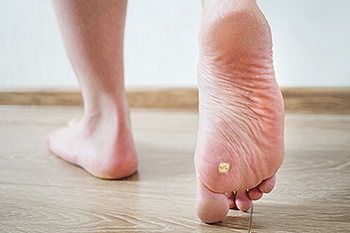Treatment Options for Plantar Warts
Tuesday, 06 June 2023 00:00
A plantar wart is a growth that develops on the sole of the foot. The wart is caused by coming into contact with the human papillomavirus, or HPV. Plantar warts are most commonly seen on the ball or heel of the foot. Because these two areas take the force of your weight, the wart may become hardened and look like a callus. It also may contain tiny black dots that are actually dried up or clotted capillaries. Plantar warts are contagious and should not be touched, if possible, because they can be spread to other body parts. Treatment options range from applying salicylic acid to remove the wart layer by layer to removing the wart at one time by surgery. Additional treatments of plantar warts include spraying with liquid nitrogen and laser therapy to burn off the wart. Each type of treatment brings with it certain painful or annoying side effects, and the methods take varied amounts of time to get the best result. For help with a plantar wart, it is suggested that you make an appointment with a podiatrist who can prescribe the treatment that will work best for you.
Plantar warts can be very uncomfortable. If you need your feet checked, contact John Horlebein, DPM from Northern Cascades Foot & Ankle, LLC. Our doctor will assist you with all of your foot and ankle needs.
About Plantar Warts
Plantar warts are the result of HPV, or human papillomavirus, getting into open wounds on the feet. They are mostly found on the heels or balls of the feet.
While plantar warts are generally harmless, those experiencing excessive pain or those suffering from diabetes or a compromised immune system require immediate medical care. Plantar warts are easily diagnosed, usually through scraping off a bit of rough skin or by getting a biopsy.
Symptoms
- Lesions on the bottom of your feet, usually rough and grainy
- Hard or thick callused spots
- Wart seeds, which are small clotted blood vessels that look like little black spots
- Pain, discomfort, or tenderness of your feet when walking or standing
Treatment
- Freezing
- Electric tool removal
- Laser Treatment
- Topical Creams (prescription only)
- Over-the-counter medications
To help prevent developing plantar warts, avoid walking barefoot over abrasive surfaces that can cause cuts or wounds for HPV to get into. Avoiding direct contact with other warts, as well as not picking or rubbing existing warts, can help prevent the further spread of plantar warts. However, if you think you have developed plantar warts, speak to your podiatrist. He or she can diagnose the warts on your feet and recommend the appropriate treatment options.
If you have any questions please feel free to contact our office located in Chelan, WA . We offer the newest diagnostic and treatment technologies for all your foot and ankle needs.






